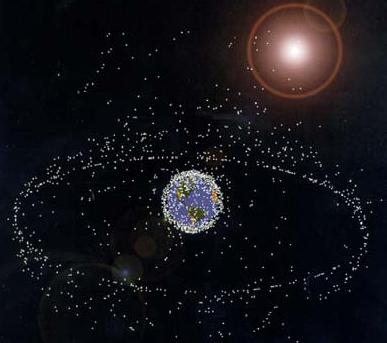This article is more than 1 year old
US air force inks 'tactical' space-war deal
Space war: More like rugby than chess
American weaponrytech behemoth Lockheed Martin has been awarded a $30m contract by the US Air Force Space Superiority Systems Wing. Under the deal, Lockheed will develop a prototype "tactical" space scanner for use in the covert orbital warfare of tomorrow.
The tech demonstrator programme is referred to as Self-Awareness Space Situational Awareness (SASSA), and will see Lockheed developing a "payload to provide tactical space situational awareness with dedicated communications".

Near-Earth space ... lots of players on the pitch.
The US military and intelligence communities operate a satellite fleet numbering in the hundreds, with missions ranging from spying to communications to navigation. Civilians worldwide also depend on some of these satellites - especially those of the Global Positioning System (GPS), used by the vast majority of the world's satnav devices.
These satellites are a major part of America's power - its ability to watch the world and operate globally. But they are far from invulnerable, as the famous Chinese antisatellite interceptor test of 2007 (and the US Navy shootdown later that year) have recently shown.
Quite apart from shooting at satellites from the ground, there are other methods which rival powers might use to nobble each other's spacecraft or play cunning space tricks on one another - perhaps in a less obvious fashion than firing a rocket up from one's own territory. The US satellite fleet, after all, is far from alone - there are more than 8,000 known objects being tracked in Earth orbit by the Pentagon.
Various cunning tricks can be used to disguise just what a given nation is doing. America already has plans to put up surveillance spacecraft not to monitor events on earth, but rather to keep track of what foreign satellites are up to.
As this Lockheed pdf brochure puts it:
There is a need ... to understand when a satellite manoeuvres, to understand when something deploys off a satellite or a bus ... ultimately to be able to determine the capabilities of the satellite and the intent of the operator ... Objective: monitor blue, red and grey space order-of-battle ...
Blue forces are friendlies, of course, and red are known hostiles - but a lot of the time there's something in space and nobody but its makers know where it came from or what its mission is.
Strictly speaking, direct military action in space is a no-no, an international diplomatic position which was established following Soviet and US sat-buster weapons trials back in Cold War times. It's OK to use space for military purposes, but not to actually start making active strikes against other people's machinery. Probably. Unless you really need to.
Thus America doesn't admit that it has any pukka anti-satellite weapons - just missile-defence ones like the Standard interceptor used in its Pacific spy-bird shootdown last summer, and groundbased sat jammers ("Offensive Counterspace" CCS) whose effect is claimed to be "temporary and reversible". Likewise, nations such as Russia, China, Iran et al all deny that they even want the ability to fight a war in space - but all happily admit that they want the ability to put things up there.
Hence the SASSA demo inked today, which is intended to evolve into a package which could be added to future US satellites, letting them know when they came under attack and relay information back to the air force Space Superiority Wing in California. Without SASSA, goes the thinking, American satellites might one day simply go offline at inopportune moments and the US would have no idea just who had nobbled them or how - or even, if it was just one or two sats, any real certainty that nobbling had taken place.
Out-and-out warfare in orbit would seem to remain unlikely for the foreseeable future, then. But moves like today's indicate that coming decades will see the established and emerging space powers jockeying for advantage on the orbital playing field.
By and large the rules will be followed - but an occasional crafty foul while the ref's attention is elsewhere seems more than likely. Just as in international rugby, tactics which are theoretically verboten seem likely to become part of the game.
Watch this <cough> space. ®
